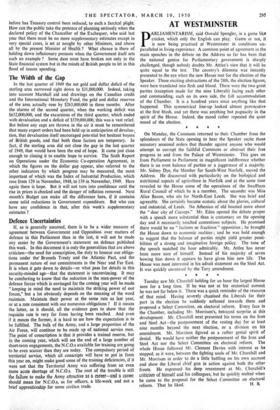AT WESTMINSTER p ARLIAMENTARISM, said Oswald Spengler, is a game like
cricket, which only the English can play. Game or not, it is now being practised at Westminster in conditions un- paralleled in living experience. A common point of agreement in the main speeches in the debate on the Address so far has been that the national genius for Parliamentary government is sharply challenged, though nobody doubts Mr. Attlee's view that it will be quite equal to the test. The country's dilemma was instantly presented to the eye when the new House met for the election of the Speaker. Those exciting abstractions of the 24th, the election figures, were here translated into flesh and blood. There were the two great parties (exception made for the nine Liberali) facing each other and commanding, each on its own side, the full accommodation of the Chamber. It is a hundred years since anything like that happened. This symmetrical line-up looked almost provocative at the first blush, and yet there was anything but pugnacity in the spirit of the House. Indeed, the mood rather repeated the quiet mood of the election.
* * * * On Monday, the Commons returned to their Chamber from the splendours of the State opening to hear the Speaker• recite those minatory sessional orders that thunder against anyone who would attempt to corrupt the faithful Commons or obstruct their free progress to and from the Palace of Westminster. This goes on from Parliament to Parliament in magnificent indifference whether there is an even balance of parties or a juggernaut of a majority. Mr. Sidney Dye, the Member for South-West Norfolk, moved the Address. He discoursed with particularity on the biological and nutritional aspects of agriculture in Norfolk and at the same time revealed to the House some of the operations of the Swaffham Rural Council of which he is a member. The seconder was Miss Alice Bacon, who sits for North-East Leeds. She was brief and agreeable. She certainly became ecstatic about the glories, cultural and industrial, of Leeds. No Athenian of old boasted more about the "dear city of Cecrops." Mr. Eden opened the debate proper with a speech more substantial than is customary on the opening day and it necessarily touched contentious subjects. He promised there would be no "factions or fractious" opposition ; he brought the House down to economic realities ; and he was bold enough to suggest that the balance of parties might yield greater possi- bilities of a strong and imaginative foreign policy. The tone of the speech matched the hour admirably. Mr. Attlee has never been more sure of himself. Instead of his majority of seven bowing him down it appears to have given him new life. The House was most interested in his adroit statement on the Steel Act. It was quickly countered by the Tory amendment.
* * * * Tuesday saw Mr. Churchill holding for an hour the largest House seen for a long time. If he was not at his oratorical summit he was not far below it. There was a quick reminder of the resource of that mind. Having severely chastised the Liberals for their part in the election he suddenly softened towards them and proposed a Select Committee, on electoral reform. Every face in the Chamber, including Mr. Morrison's, betrayed surprise at this development. Mr. Churchill next presented his terms on the Iron and Steel Act—the postponement of the vesting day for at least nine months beyond the next election, or a division on his amendment. Mr. Morrison figured as a rather genial spirit of denial. He would have neither the postponement of the Iron and Steel Act nor the Select Committee on electoral reform. The whole House followed Mr. Clement Davies with interest as he stepped, as it were, between the fighting souls of Mr. Churchill and Mr. Morrison in order to do a little battling on his own account and show the Liberal chief gun in action against both the other fronts. He expressed his deep resentment at Mr. Churchill's criticism of himself and his colleagues, but he quickly melted when he came to the proposal for the Select Committee on electoral


































 Previous page
Previous page